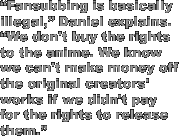|
And to their credit, the fansubbers are succeeding - over the years, industry bigwigs have noticed which titles get the attention and shaped their distribution efforts accordingly. By using the fansubbers as a sort of free market research tool to aid in choosing which titles to release, distributors have an easy way to minimize costs while maximizing profitability. "Fushigi Yûgi" is just one of the now-familiar titles that wouldn't be here if not for the unrecognized, unappreciated, and often-overlooked work of a few devoted fans.
It works like this: a fansubber finds a title that isn't available domestically, and decides to share it with the rest of the world. So with the help of a downloadable software program like Sub Station Alpha and a Genlock card - a particular piece of video hardware that integrates images with text - a fansubber translates and adds subtitles to the original Japanese release. If they do a good job, if the equipment is up to snuff, and if the title proves interesting, people notice. Eventually, a distributor will license the title, produce it themselves with their own translation, and market it to the world. Given that these distributors reap 100% of the profits from fansubbed efforts, it seems predictable that those in charge of the titles would be at least amicable to the notion of outsourced translation, if not outright grateful for the help. So why is it that no one even knows that fansubbers exist? Daniel, a member of the L.A.-based fansub unit Team Abcb, answers this question. "Fansubbing is basically illegal," Daniel explains. "We don't buy the rights to the anime. We know we can't make money off the original creators' works if we didn't pay for the rights to release them." No fansubber argues over the legality of translating another's work for distribution. But the way they see it, it's a labor of love. No money changes hands. Still, there are a few out there that aren't happy with merely sharing their love of anime, or respecting the rights of the anime producers. "Andy," an ex-fansubber now working in the anime industry who asked us to use a pseudonym, cited S. Baldric as an example of a bootlegger posing as a fansubber. "Fansubbers have a sense of honor about the craft," Andy explains. "If you start accepting money or making money, then you reach the realm of bootlegging. If you continue to do a series that is picked up by a US company, you are bootlegging. You do not want to be known as a bootlegger."
A quick online search turns up some work by S. Baldric (a collection of "Dragon Ball" titles) which is licensed by Funimation (the original series is also scheduled for a run on the Cartoon Network) for domestic distribution. Interestingly enough, at least one site expands on the "bootlegger" distinction, complaining that Baldrick's work isn't even all that good. Another, with a list of translated scripts for fansubbers, warns against helping bootleggers: "Well here I have all the movie scripts for each of the DBZ movie 1-13...These scripts are not for bootlegging scum to dub the DBZ movies and use these scripts for subbed translations, and sell them for a way out of price. These scripts are for people who own the pure Japanese, or no subbed movies of DBZ 1-13...Anyways enjoy the scripts save 'em, read 'em, put them on your page. But remember do not give these to bootleging scum, like: E. Monsoon, a.k.a. S. Baldric, or James and Games, or any other none anime lab oriented business." (from http://www.geocities.com:0080/Tokyo/Shrine/4309/scripts.html) |


